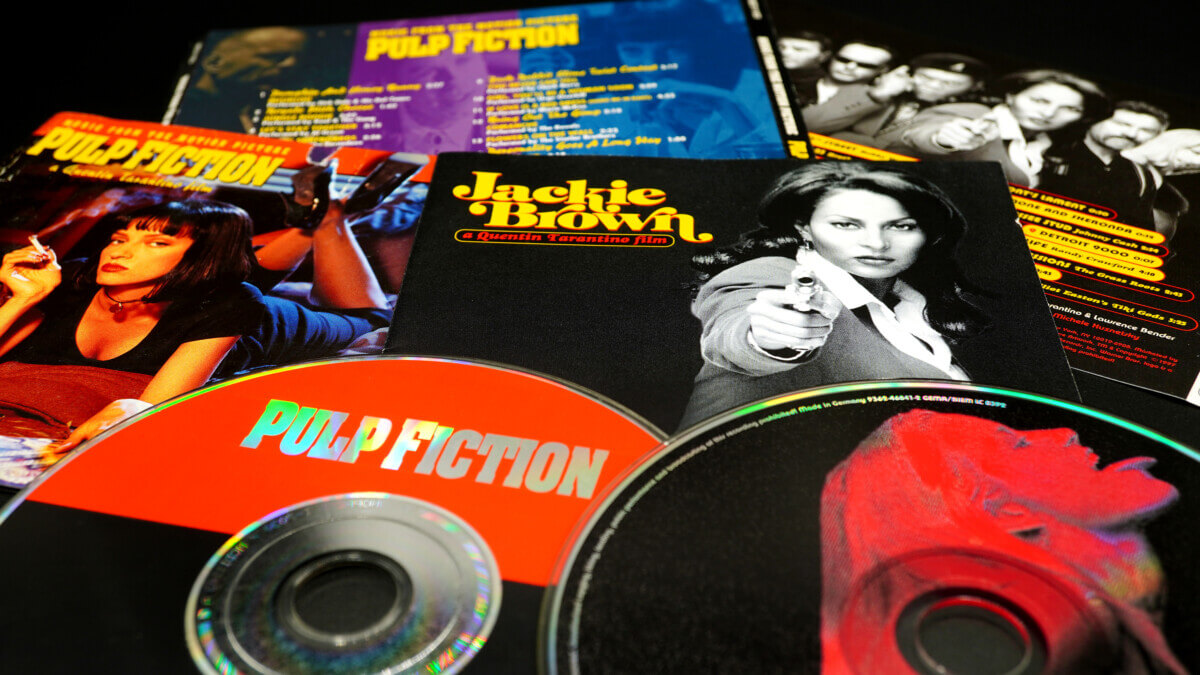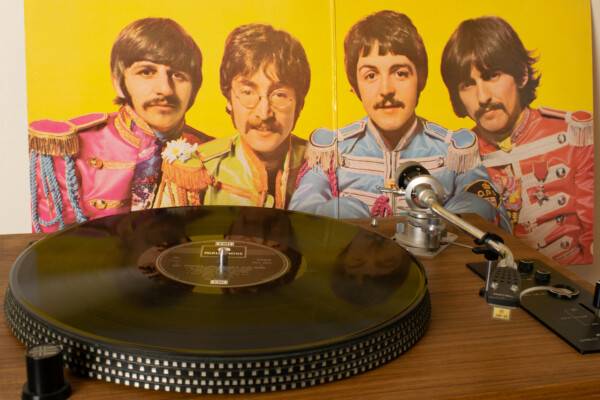
"Pulp Fiction" and "Jackie Brown" discs (Photo by Kraft74 on Shutterstock)
EdNews compiles lists of consensus picks featured on credible review sites. We aim to lay out top consumer research finds for you by bringing expert rankings to one place
Lights, camera, action! Quentin Tarantino, the maverick filmmaker, has redefined cinema with his unmistakable style and unforgettable characters. From the adrenaline-fueled narratives to the razor-sharp dialogue, each of his movies is a masterclass in storytelling. Whether you’re a die-hard fan or a Tarantino newbie, dive into our curated list of his best films and relive the moments that made movie history. Prepare to be enthralled, shocked, and utterly entertained by the cinematic genius of Quentin Tarantino! Tarantino’s films appeal to various audiences in different ways, so naming the top five will always be a subjective task. To help narrow down a list of his greatest films, EdNews went to 10 expert websites to name these few as the best Quentin Tarantino movies to date. Let us know which is your favorite flick, and why, in the comments below.
Table of contents
The List
1. “Pulp Fiction” (1994)
Topping Ranker’s list of the best Quentin Tarantino movies is “Pulp Fiction.” The imaginative thriller was the director’s first major box office success and it won Best Original Screenplay at the 1994 Academy Awards.
So, what makes this film such a classic? “The narrative complexity and imminent quotability of Pulp Fiction make this movie impossible to avoid or ignore,” says The Manual. “With outstanding acting across the board and the perhaps most iconic soundtrack in cinema history, it’s no surprise Pulp Fiction was nominated for several Oscars. The very conceit of philosophically inclined hitmen on an existential and magically real journey has left an entire neo-noir subgenre of films in its wake. Although the rapport between characters is usually quite endearing, there are unfortunate segments of the script that simply don’t hold up to today’s standards of decency in ways that are patently unforgivable.”
“True to its title, Pulp Fiction is the glorious result of Tarantino stringing together a slew of unused ideas, each more action-packed than the last,” writes IndieWire. “Pulp Fiction ties that chaotic tension off with a nonlinear narrative bow for the ages, delivering a puzzle box black comedy that has amused and intrigued generations of moviegoers.”
It's not surprising that this is the first film that comes to mind when thinking of Tarantino movies. “The film that made Tarantino a household name is still a landmark, and for good reason,” states Collider. “A second feature shouldn’t be as brash and confident as Pulp Fiction, but Tarantino knows exactly what he wants to do and has no reservations pushing his style. It’s a movie that’s constantly throwing curveballs at the audience, but that’s kind of the point.”
2. “Reservoir Dogs” (1992)
Quentin Tarantino’s directorial debut came in 1992 with “Reservoir Dogs”, a taut story of a diamond heist that goes wrong and takes place almost entirely in an abandoned warehouse. It features the director himself and several famous actors, including, Tim Roth, Michael Madsen, Steve Buscemi, and Harvey Keitel.
It tops Empire’s list of the best Quentin Tarantino movies, writing: “Pulp Fiction might be bigger, but Reservoir Dogs is, arguably, just that little bit better...In a world where most of Quentin Tarantino's films stretch well beyond the two-hour mark, it's the lean efficiency, the sharpness of Reservoir Dogs that stands out – it's the nucleus of everything that makes him a masterful filmmaker, packed into a 99-minute runtime. Everything is here – the genre twists, the non-chronological storytelling, the mind-blowing music choices, the seemingly-incongruous conversations about cultural minutiae, the (no longer that) shocking violence, and above all, a sense of pure, unalloyed cool. … It's slick, funny, intelligent, and uber-stylish, an undeniable crime classic.”
“Tarantino knew enough to keep his first feature — the story of a jewel heist gone garishly wrong — relatively modest,” states Vulture. “It’s essentially a chamber drama with a small, all-male cast that’s set (largely) in one place. But you know from the way the men in black suits with skinny black ties seize the space in the first scene — and then, in a diner, argue for many minutes over the ethics of tipping — that Tarantino is announcing himself as a different kind of pulp director. … There is no center of gravity. And there’s no way to end a film so agonized — the plot centers on the surviving gang members’ attempt to discover which of them is a rat (or an undercover cop) — without building to a climax that’s like a Grand Guignol opera.”
This is undoubtedly one of the director's greats. “With a video store education in film and three short films under his belt, he [Tarantino] wrote and directed Reservoir Dogs, a bloody, profane, and claustrophobic spin on old heist films like City on Fire and Stanley Kubrick's The Killing, and it would set a very distinctive standard for his entire career going forward,” writes Screen Rant. “A film about a group of criminals hiding from the cops after a robbery doesn't seem particularly original on paper, but Reservoir Dogs benefits from its distinct tone of voice. It scrambles the linear format, feeding the audience bit by bit in a deliberately disordered sequence of events; and the most fascinating element is that it's not to pull the rug out from underneath the audience, but the characters. This isn't a mystery, but a ticking time bomb, and the fun (though some discomfort) of watching Reservoir Dogs is waiting for revelations to surface as the runtime winds down.”
3. “Jackie Brown” (1997)
This one tops Parade’s list of the best Quentin Tarantino movies, calling it mature, soul-satisfying storytelling.” Even though it wasn’t his biggest commercial success, it stands the test of time as a rich story that has it all: great characters, humor, danger, thrilling scenes, and romance.
“Jackie Brown is as much a crime film as it is a love letter to its star, Pam Grier — without whom this movie amounts to very little,” gushes The Manual. “Luckily, Grier’s inimitable presence is enough to skyrocket Jackie Brown to the higher reaches of this list. Dryly funny and emotionally complex, the eponymous criminal heroine’s quest for freedom is both harrowing and entertaining. Samuel L. Jackson is a perfect foil for Grier’s grace, and the movie’s music has left a mark on cinema culture forever.”
“In one sense, Jackie Brown is an anomaly in Tarantino’s career, in that it’s the only time he has adapted anything, in this case, Elmore Leonard’s novel Rum Punch, for the screen,” says TechRadar. “But in every other way, it’s a classic Tarantino movie with his trademark swagger, great soundtrack and a cast of double-crossing rogues.”
4. “Inglourious Basterds” (2009)
This bit of revisionist fantasy — which puts a spin on an episode in World War II — is pure Tarantino. There’s fantastic dialogue, a villain you can root for, and a portrayal of just how ugly a war can get. “Tarantino's World War II movie ends on a mic-drop line: ‘I think this might just be my masterpiece.’ And if it's not quite the filmmaker's very best, it's close – a sprawling and anarchically anachronistic historical tale that sees French cinephiles and vengeful Jewish soldiers destroy the Nazis,” writes Empire. “If his greatest strength has always been his writing, the Basterds screenplay is top-tier Tarantino – see the gut-wrenchingly tense opening encounter with Christoph Waltz's Colonel Hans Landa (one of QT's best characters), or the ever-ratcheting stakes of the card came in the La Louisiane chapter.”
“This World War II-era thriller is Tarantino the filmmaker at his most confident: revisionist history that's at once high art, and more popcorn-munchingly entertaining than anything playing at the multiplex,” states Parade. “The final moments rewrite history in a symphony of blood, guts and flames, to jaw-dropping effect. It is probably the most exciting thing Tarantino has ever filmed. The spirit of Inglorious isn't far removed from that of Django Unchained, but this is a far more thoughtful, clever and dramatically weighty picture. The best part: Christoph Waltz did a clean sweep of awards season for his chilling portrayal of Nazi colonel Hans Landa. Some say Landa is Tarantino's most unforgettable character of all.”
“The first of Tarantino’s movies to rewrite history, Inglourious Basterds shows a remarkable amount of maturity from the director while still maintaining his voice and style,” says Collider. “It’s a film that’s far more controlled and willing to luxuriate in long conversations. It uses notions of observed and unobserved (everyone is putting on a show for others in this film) to ultimately make a movie about movies.”
5. “Once Upon a Time in Hollywood” (2019)
This re-imagining of a real-life moment is a fun love letter to a bygone Hollywood era. With the likes of Leonardo DiCaprio, Brad Pitt, Margot Robbie, and other stars, what’s not to love? “A jubilant, wistful, altogether exhilarating comeback for Tarantino — a pastiche that transcends pastiche,“ states Vulture. “It’s a fantasia of the late ’60s, when middle-aged TV cowboys headed off to Italy to make spaghetti Westerns while hippies invaded Hollywood — some of them turning out to be members of the murderous Manson Family.”
As the most recent film on our list, this film already has found a place among Tarantino's classics. “Once Upon a Time in Hollywood is fan fiction in the best way possible,” says Screen Rant. “It's also one of Tarantino's most sympathetic films. … Whereas most Tarantino films are wrapped up in complicated plot lines seemingly designed to push the limits of story structure, Once Upon a Time in Hollywood is too busy reflecting to race.”
“It might be his most thoughtful and most introspective film, with only Jackie Brown as a competing contender (even though it was an adaptation),” writes whatNerd. “What a great high note this would be to go out on.”
Sources used and their top picks
- TechRadar - “Pulp Fiction”
- Parade - “Jackie Brown”
- Vulture - “Pulp Fiction”
- Collider - “Jackie Brown”
- Screen Rant - “Inglourious Basterds”
- Ranker - “Pulp Fiction”
- whatNerd - “Jackie Brown”
- Empire - “Reservoir Dogs”
- The Manual - “Kill Bill”
- IndieWire - “Pulp Fiction”
Note: This article was not paid for nor sponsored. EdNews is not connected to nor partnered with any of the brands mentioned and receives no compensation for its recommendations. This article may contain affiliate links in which we receive a commission if you make a purchase.










